Just as one ship and Danish hostages are released, another yacht is hijacked. Oman navy thwarts hijack attempt and frees Indian crew whilst arresting pirates. Captives remain in grave danger, some over a year. Private security divides government and shipowners. Who is really getting rich from Somali piracy? A life sentence is upheld and Seychelles hosts a landmark anti-piracy meeting. A danger of copycat piracy is mooted, and piracy drives up LNG insurance premiums. The book trail is on.
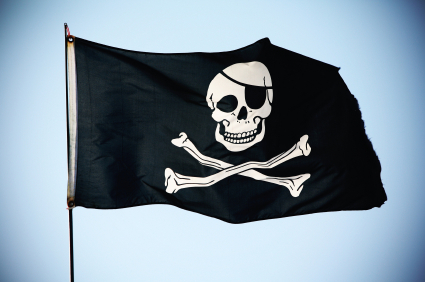
In a week where many reporting centres, news agencies, websites and blogs have stated the past week has seen no pirate attacks in the Horn of Africa region, in fact one hijack and two attacks have been reported. A hijack occurred Sept 8 in the Gulf of Aden only 10nm off the Yemen coast. A French catamaran, SY Tribal Kat, was attacked by pirates only a day or so after the release of the Danish family and crew hostages. A warship found and inspected the yacht with no persons found on board.
An attack on September 1 was thwarted by the Royal Oman Navy which also resulted in the rescue of 11 Indian crew and the arrest of 10 pirates, or 5 depending on the source, on board an Indian fishing dhow. The other attack was reported via MSCHOA stating that an unidentified vessel was chased and fired upon by five pirates in two skiffs Southeast of Muscat. Not so quiet after all. However, the good news for seafarers is the release of the container ship, MSC Panama, and its 23 crew, reportedly for $7 million, and shortly followed by the release of the Danish family and crew taken days after the tragedy of the US yacht killings.
Sadly, the plight of MV Albedo remains in doubt. There is a possibility of the ship being used as a mothership as the $5 million ransom demand fails to be met. Some of the crew have been held separate from the remainder of the crew. MV Olib G reaches a sad anniversary; over a year in captivity. Pirate groups continue to fight amongst themselves with 2 killed and further fighting between police and militia sees 3 people killed in Bosaso.
The South Korean appeal court upheld a decision to impose life sentence for a pirate involved in hijacking a ship and shooting its captain. US MARAD issues an advisory to US ships for the Horn of Africa. Seychelles co-hosts a landmark anti-piracy conference, whilst Dutch shipowners and the government face-off over private security to protect their vessels.
The question of who is really getting rich from Somali piracy as a business model innovation is raised, and piracy is driving up LNG insurance premiums. India’s maritime trade is being hurt by piracy and the Gulf States should beef up coastal security against pirate attacks. The potential severity of the danger of West African piracy is highlighted by concern for copycat piracy.
The book trail is in full swing as hostage stories spawn books.
Pirate Activity
French diplomatic official said a mayday call was made by the French catamaran, SY Tribal Kat, and by the time German frigate Bayern arrived, the yacht was empty with what were described as "suspicious marks" aboard.
The sailboat is currently being towed to safe waters for further analysis by officials. At this time, it is believed that there were two French crew members taken captive, but their whereabouts are currently unknown.
The Yemeni coastguard official said, however, "two yachts with a total of six French citizens aboard had entered Yemeni territorial waters on August 19 and had left on September 4," according to AFP.
It is not clear why the suspected pirates decided to abandoned the vessel.
Her itinerary shows that she had been calling into the Greek Island of Crete, Turkey, Greque and Tunisia before transiting through Suez Canal sailing to Aden. Her movements since May 2010 indicate that she was anchored at Aden on August 19, 2011.
Somali pirates holding the Malaysian flagged cargo ship MV Albedo are demanding $5M to release the vessel and the crew and are planning to use the vessel as a mothership to support their piracy operations, Somalia Report has learned.
The vessel is running out of ship stores, fresh water supply, fuel, and some of the hostages are very sick, according to a source close to the pirates.
 |
| MV Albedo (eunavfor) |
The operations manager of the vessel told Somalia Report Sunday evening that, "the pirates made a mistake to hijack our vessel because we are only small shipping company and have only one vessel. We hope leaders of the pirates to consider our company condition and release our vessel as soon as possible."
Further he added that, "If the pirate leaders think that they can get money from us, they are wrong. We are nothing now, just hope to get donations from our friends in Pakistan and Malaysia. So far we have only managed to collect donations from people of Malaysia and Pakistan amounting to US$1.2 million."
The vessel was attacked by pirates on November 26, 2010 while underway some 293 miles west of the Maldives on the Indian Ocean while heading to Mombasa port from port Jabel Ali laden with full containers.
About 9 of the 23 crew members of the vessel are being held hostage ashore while the rest are being held aboard the ship. The crew is made up of Bangladeshi, Iranian, Pakistani and Sri Lankan nationals.
Three people were killed and five others were wounded in a clash between the police and militia in the port city of Bosaso in Puntland, Somalia, writes Somalia Report.
Sources claimed a group of militia opened fire on two police vehicles as the police were to arrest a well-known pirate in a house in a Bosaso neighbourhood since late June. Heavy gunfire was exchanged lasting around an hour and a half.
At least two pirates were killed and three others injured when unknown gunmen attacked a vehicle carrying Somali pirates near Hobyo district, Mudug region on Tuesday night, residents said. Sakariye Dahir, a resident of the pirate hub of Hobyo, told Somalia Report that the gunmen escaped from the area before and security forces from Galmudug regional state reached the scene.
“The pirates were from Galkayo and heading to Hobyo; they were well known pirates in the area,” he told Somalia Report. “I think the murderers were other pirates, because they often argue over ransoms and kill each other.” The casualties were rushed to Galkayo hospital, while angry pirates searched the area for the killers. MSC Panama was released for $7 million, while seven Danish hostages were released for $3 million. It is not clear if the killings were linked to either of these cases. Deadly battles have increased between pirates in recent months, which observers say could be due to new groups trying to enter the market.
The Embassy of Somalia in Muscat has received confirmation from the Ministry of Foreign Affairs that five Somali nationals were detained by the Royal Navy of Oman last week in a raid on a fishing vessel suspected to have been hijacked.
Officials at the Somali mission told Muscat Daily that they received a letter on Tuesday describing the facts of the case and stating that the five suspects had been detained for suspected looting.
“The Ministry of Foreign Affairs sent a letter to the embassy about the detention of five persons by Omani authorities. It is too early to say if we will be sending an official to Salalah to meet the five detainees. We will know more by the beginning of next week. Any consular assistance that could be provided depends on the case itself and the severity of the offence. We will cross that bridge when we come to it,” said a senior official at the Embassy of Somalia.
Although reports earlier this week indicated that ten Somali nationals were captured in the security operation, embassy officials stated that they only received information on five persons and refused to speculate on the discrepancy.
The suspects were arrested on board a dhow that had reportedly been hijacked in Somali waters. The operation also secured the release of 11 Asians. The incident comes at a time of intense pirate and military activity in the area, with three recorded pirate attacks off the Omani coast in the past 17 days.
Released By Pirates
The Danish yachting family held hostage since February have been released, the Danish Foreign Ministry said Wednesday, one day after Somalia Report reported they had been removed from the Greek-owned, Panama-flagged vessel, MV Dover, and that a ransom was said to have been paid.
 |
| Johansen Family (Source: Somalia Report) |
The seven hostages are "well" given the circumstances, the foreign ministry said, and are expected back in Denmark shortly. A source at the Danish Embassy in the Kenyan capital Nairobi told Somalia Report they were already travelling back to their home country.
On Tuesday, a pirate named Mohamed Ahmed, told Somalia Report that the seven Danes were put on a small boat at 8am, and that it was his understanding that a $3 million dollar ransom had been paid for them. He said he had also been told they were to be delivered to a warship – possibly Danish – that was in the vicinity of Rasu Bina village, where the MV Dover is anchored. However, there was initially no independent confirmation of the ransom, and NATO and EU NAVFOR both told Somalia Report they had not heard of any such payment. NATO said that there was no Danish warship under assignment to the anti-piracy mission following the end of the Esbern Snare’s deployment, and the Danish navy also said it was unaware of any release.
The release of the Danes was not in line with what many sources said was the expected deal, which was that the Danes would be released at the same time as the MV Dover, upon which the hostages have been held for a large chunk of their captivity.
$3.5 million dollars was delivered several weeks ago, and another $3 million was to be delivered to complete the deal, several sources told Somalia Report. The release was due to have been completed before the end of Ramadan. It is not clear if the money Ahmed referred to was freshly delivered cash. Read more OCEANUSLive.
 |
| MSC Panama (Source: Vesseltracker.com) |
Somali pirates have freed the Liberia-flagged container ship, MSC Panama, seized December 10, 2010, after receiving a ransom payment of $7 million on Tuesday, according to pirates that held the vessel in talking to Reuters. The vessel was hijacked on December 10 en route from Tanzania to Mozambique with a crew of 23 from Myanmar. "We received the agreed ransom of $7 million early in the morning after long negotiations. Now we have abandoned the ship and it is sailing away safely," a pirate who gave his name as Abdi told Reuters.
Pirates in Court
A South Korean appellate court has upheld a life sentence imposed on a Somali pirate for hijacking a ship and shooting its captain, reports Forbes.com.
Five Somali pirates were captured during a raid on a hijacked South Korean-operated cargo ship, Samho Jewlery, in the Arabian Sea in January. The South Korean military operation killed eight pirates. During the raid the ship's South Korean captain was shot and wounded by a pirate.
A district court in the South Korean city of Busan subsequently sentenced one pirate to life in prison and four other pirates to between 13 and 15 years behind bars. On Thursday the Busan High Court upheld most of the district court's ruling, though it reduced one pirate's sentence by three years.
Both the pirates and prosecutors have one week to appeal, reports Associated Press.
Private Security
Shipowners should not get private security to protect their vessels against pirates but should leave their protection to the government, a special committee has concluded. The proposal has angered the Dutch shipowners, who say it’s impractical and needlessly complicated, reports Radio Netherlands.
Merchant shipping, the committee proposes, should get temporary military protection. Committee chair Joan de Wijkerslooth: “We're not saying private security is not allowed. All we're saying is: don't start there. Under current circumstances, it’s much easier for the defence ministry to deploy people, on a temporary basis, for example from private security firms. These people can then be sent along, with the status of temporary soldiers.”
Impractical -Tineke Netelenbos, who represents the Dutch shipowners, dismisses the proposal as impractical. “The government should certify certain private security firms and see to it that shipowners only use those that are certified. That's much more practical than the current roundabout proposal, which is going to cause a lot of red tape at the defence ministry."
Heavy weapons - Pirates, the committee maintains, can only be deterred with heavy automatic weapons. Temporary soldiers are allowed to use such weaponry, but private security guards are not. That would require changing the law, which would take two or three years. “Does that help the shipowners now? It doesn’t” De Wijkerslooth warns.
The past few years have seen 250 Dutch requests for additional security. Only a few dozen have been granted. Despite the constant threats, no Dutch ships have been attacked by Somali pirates. De Wijkerslooth says he understands the shipowners’ worries.
“Currently, ships sail in convoys or make illegal use of private security guards. That’s not the idea: if something goes wrong, shit will hit the fan.”
Europe-wide headache - Defence Minister Hans Hillen reacted by saying: “It’s important that the committee has concluded that the use of force is something for the government to coordinate. But our talks with the shipowners are excellent and we also provide them with marines. So I trust we’ll work things out.”
Other EU countries are facing the same problem. But Norway does allow private security firms to protect ships. De Wijkerslooth: “There are a few countries that do. I know German politicians are beginning to consider the option too. But then it has to go to the cabinet, and after that it has to become law.”
Most of the pirates threatening the ships come from Somalia. Are talks being held with Somalia about this? De Wijkerslooth: “No, talks with Somalia are not an option now. The country no longer has a functioning administration, none at all. And even if they really wanted to do something about it, they simply lack the capacity. They have no normal infrastructure. So it’s of no use.”
Pirates tried in the Netherlands - Five Somali pirates captured by the Dutch navy in November 2010 were tried in the Netherlands in August 2011. They were found guilty of hijacking a South African yacht and sentenced to prison terms ranging between 4½ and 7 years. South Africa refused to try the suspects.
Economics of Piracy
The cost of insuring liquefied natural gas (LNG) tankers has risen as naval containment of piracy fails and surging global demand spurs traffic through high-risk waterways, increasing the risk of hijack and armed attack says Arabian Business.
The annual pace of growth in insurance costs over the last decade was 7.5 percent, much more rapid than the 4.2 percent annual increase in LNG tanker operating costs, figures from shipping consultancy Drewry show.
Standard-sized vessels will fetch an estimated $14,291 per day in insurance costs this year, according to senior Drewry LNG analyst Pranay Shukla, reflecting the heightened risk of hijack and pirate attack for the transit of the super-cooled gas.
As a result, more shipowners have confirmed using private armed guards in the last year as they struggle to stem costs and protect trade as piracy escalates, they said.
"The threat of piracy has fundamentally increased [for LNG carriers], particularly in the Gulf of Aden, where underwriters have sought to charge additional premiums due to the increased risk," according to one insurer.
Additional premiums on war risk policies have risen as LNG tanker traffic through the Gulf of Aden reached record levels last year, owing to more supply from Qatar and Yemen as trade with Europe and South America rises.
Over 885 LNG carriers sailed through the Suez Canal last year, up from 525 in 2009 and 429 in 2008, figures from the Suez Canal Authority show, while other tanker trade never fully recovered from the 2008/2009 slump, increasing the likelihood that LNG ships will start to draw unwanted attention from pirates.
Owners are not only turning to private security companies to protect LNG carriers transiting Suez but also to cut insurance costs.
"With embarked security the insurance premiums are also reduced, mitigating costs even further," said Dom Mee, president of Protection Vessels International, a provider of armed maritime security.
The risk of a catastrophic fire or explosion from small arms fire or rocket propelled grenade (RPG) strikes could motivate ship masters to allow hijacks to take place, according to another maritime security expert.
Others say that LNG owners will meet ransom demands more readily to avoid seeing their LNG cargo degrade, which has a limited lifespan in its frozen state.
Why is business model innovation important? How to design (new) business models? What are possible new revenue markets? asks Intellibriefs in their latest blog. Board of Innovation organizes an International Masterclass in Business Model Innovation on November 24, 2011. To get inspired; we will look to successful criminal businesses, and how they make their money.

As former analysis has already shown, Somali Pirates can be considered as pretty innovative businessmen. Like a good running company, they know their market by controlling Africa’s Gulf of Aden, they negotiate with their “customers” to get a better price, and in only a couple of years they have increased their “profit” with a factor 100. But are it really the pirates making the most profit out of this whole model? In a report about “The Economic Cost of Maritime Piracy”, the annual cost of Piracy, is estimated between $7 to $12 billion dollars.
The most remarkable fact is that only less than 2% of the annual estimated cost actually goes to the pirates. So where is all the other money going to? The business model involves more parties then only Somali fishermen and shippers. As we have visualised below; insurance companies, security contractors and national navies are winning in this model too.
The piracy model is a great example of the “Fear Economy”. Nowadays many (legal) companies use “fear” to boost their business. Think about the soaring sales of anti-radiation tablets and Geiger counters after the Fukushima disaster, “healthy” drinks to lower your cholesterol level, expensive anti-hacker software, and of course… unnecessary insurances.
In 2010, $148 million of ransoms were paid to pirates. On the other hand, $1.85 billion dollars were spent on insurances to cover piracy, that’s 10 times more than the actual ransoms that are given to pirates. In reaction to the growing threat and cost of ransoms, the whole model came in a loop and the maritime insurance industry has responded by increasing its shipping rates and premiums. As national navies declared the Gulf of Aden as a war zone, premiums increased even more.
Another winning party are the private security contractors. Their job is not to prevent piracy but to free the ship and crew by negotiating and delivering the ransom. Of course, it is in the interests of insurance companies that those ransoms stay as low as possible; that is why a good collaboration between those two parties has been established. Security contractors enter into a sort of partnership with the attackers, building up reputation for fair play. “Successful negotiation funnels cash to criminal gangs, fuelling further hijackings — and further opportunities for security companies.”
If you know that only 0,2% of all cargo ships in the northeast Gulf of Aden is hijacked, the average cost of an armed transit through Somali waters is in the order of $34.000, war risk insurance can go up to $150.000 per ship, per voyage; it’s maybe better to take the risk!
Mrs Sunita Mainee Ahmad, wife of the Indian Ambassador Talmiz Ahmad, has said piracy at sea involving Somali pirates has become a major factor in pushing up marine insurance charges, which are ultimately passed on to the customer by the insurance companies. Since the Indian government refuses to deal with the pirates, this puts the onus on the shipping company to pay a huge ransom to rescue its personnel when the vessel gets hijacked.
An extract from an exclusive interview with Yahind.com, Mrs. Ahmad was asked...
Q. Gulf shipping has become a risky business these days in view of repeated attacks on merchant vessels by Somali pirates. As a maritime lawyer, what is your take on the impact of hijackings at sea? To what extent has it pushed up the cost of marine cargo service and affected maritime trade?
A. We have been discussing this issue for the last three years. Yes, as a result of piracy, insurance costs have gone up for all the charters and voyages. It has become a risky business, as it is not always possible to protect the vessels effectively all the time. The Somali pirates are also taking people hostage, and many others are getting injured or even killed during shootouts. While our government, like most governments around the world, will not negotiate with the pirates, some Gulf and European companies are reported to have paid ransom to secure the release of their people.
Overall, piracy has pushed up the cost of marine transportation, marking a trend that has been ongoing for the last two to three years. Some countries use back channel-negotiations with the Somali government or other recognised authorities. But, generally speaking, in the absence of an effective legal and diplomatic remedy, it is a chaotic situation.
West Africa Piracy
Despite a massive naval presence in the Gulf of Aden and some successful prosecutions - of five pirates behind the hijacking of a South African yacht in the Netherlands, and of several pirates involved in the shooting death of four American sailors, piracy is one of the world’s few booming industries in this global economic downturn.One of the joys of sailing is the freedom to go where you want when you want. While all sensible cruising sailors are now avoiding the western Indian Ocean as too dangerous to sail, latest reports also suggest that West African pirates are copy-catting their Somali counterparts and cruising sailors are best to avoid these areas as well, says Des Ryan in Sail-World.
Attacks in Somalia had increased over 2010, showed no sign of slowing down in 2011, and now the copycats in West Africa pose a whole new threat to yachts, and even to international shipping.
Somewhere between 15 and 23 attacks were reported in the first half of the year in West Africa, according to the International Maritime Bureau, and are continuing at the same rate in the second half of the year.
Most have been centred in the Gulf of Guinea, off the coasts of Nigeria and Benin and have analysts very concerned.
Insurers Lloyd’s Market Association has listed the Gulf of Guinea in the same risk category as Somalia. Although it’s thought the West African pirates were inspired by their Somali counterparts, the piracy there has a slightly different character, with pirates unlikely to hold on to ships for too long, preferring instead to steal the contents (including syphoning fuel into smaller tankers) and kidnapping crew for ransom.
The Somali model usually involves holding the ship itself to ransom, along with the crew and is only possible thanks to the almost complete lack of government enforcement.
West African piracy is likely to hit Nigeria and Benin hard. Nigeria’s Port of Lagos is one of the busiest in Africa, while Benin’s government receives an astonishing 40% of its revenue from its ports.
There’s reason for nearby countries like South Africa to be concerned too; if both sides of the continent pose serious threats to shipping, the cost of shipping to and from the country might skyrocket due to increased insurance premiums, which would increase the price of all imported goods and make it a lot harder to export anything. And with the international community unlikely to finance a second anti-piracy mission in Africa, west Africa will have to find a way to deal with the problem on its own.
Sailors taking the long way to the Mediterranean via Africa will be better to follow the trade winds and sail almost across the Atlantic before swinging back to Europe. West Africa is not a nice place to be, even for ships.
Call to Arms & Action
The global shipping industry (represented by the Round Table of international shipping associations) has called for the establishment of a United Nations force of armed military guards to tackle the piracy crisis in the Indian Ocean, which it said is spiralling out of control, reports Ship Management International.
In a hard hitting letter to UN Secretary-General Ban Ki-Moon, the International Chamber of Shipping (ICS), BIMCO, INTERTANKO and INTERCARGO demanded a “bold new strategy” to curb rising levels of piracy which have resulted in the Indian Ocean resembling “the wild west”.
The letter stated: “It is now abundantly clear to shipping companies that the current situation, whereby control of the Indian Ocean has been ceded to pirates, requires a bold new strategy. To be candid, the current approach is not working.”
Regretting the increasing necessity for shipping companies to employ private armed guards to protect crew and ships, the letter continues: “It seems inevitable that lawlessness ashore in Somalia will continue to breed lawlessness at sea.”
The shipping industry organisations – which represent more than 90% of the world merchant fleet – said they fully support the UN’s long-term measures on shore aimed at helping the Somali people but are concerned that these “may take years, if not decades, to have a meaningful impact on piracy.”
Asking the UN to bring the concept of a UN force of armed military guards to the attention of its Security Council, the letter said: “The shipping industry believes that the situation can only be reversed with a bold approach that targets the problem in manageable pieces. We believe that an important element in this approach would be the establishment of a UN Force of Armed Military Guards that can be deployed in small numbers onboard merchant ships." Read more OCEANUSLive.
Reportedly, the IMO Secretary General,Mr. Efthimios E. Mitropoulos, stated it is ideal although difficult to implement.
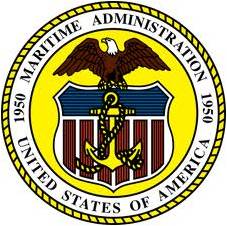
The US Maritime Administration issues an advisory of the risk to vessels transiting High Risk Waters, published via AMVER, the USCG blog.
MARAD advisory provides information on the risk to vessels transiting the high risk waters (HRW) of the Gulf of Aden (GOA), Red Sea, Indian Ocean, Arabian Sea and waters off the Horn of Africa (Somalia).
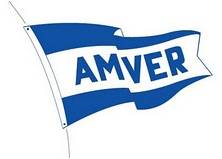
US-flag ships operating in HRW are required to comply with US Coast Guard Maritime Security (MARSEC) Directive 104-6 (current version). Read more OCEANUSLive.
AMVER (Automated Mutual Assistance Vessel Rescue System) is a voluntary global ship reporting system used worldwide by search and rescue authorities to arrange for assistance to persons in distress at sea.
Gulf States including the GCC and Oman must ramp up measures to fend off the growing problem of marine pirate attacks, or risk becoming a hotbed for hijackings, analysts said in Arabian Business. Oman in August saw two attacks on ships near the port of Salalah,

| Oman Navy (ArabianBusiness) |
with one tanker and crew snatched from inside the port in front of the coast guard, and experts warn these attacks may be the tip of the iceberg.
“The problem will only worsen in the short-term as the Monsoon season is due to end in mid-September. The Gulf of Oman might be a new area of focus, which will pose a concern for Emirati shipping interests which must pass through the area,” said John Drake, a senior risk consultant at AKE Group.
The Seoul government is striving to strengthen measures to ensure the safety of South Korean sailors aboard foreign ships as Somali piracy targeting its citizens continues, a government official said Sunday, writes Korea Herald.
Following a recent series of piracy cases involving its nationals, it has toughened security rules on South-Korean registered vessels using maritime routes where piracy is rampant. But it was not able to directly demand that foreign ships improve protection measures. Instead, it has urged a network of Korean sailors to seek ways to demand their firms provide better protection.
The government has stepped up such efforts in recent months since a Singaporean-registered ship carrying 25 crew members including four Koreans was seized by Somali pirates some 200 miles southeast of Mombasa, Kenya on April 30.
Some 4,000 Korean sailors are working for foreign firms.
The international anti-piracy conference took place this week in the Seychelles which co-hosted with the South Asia and Africa Regional Port Stability Cooperative (SAARPSCO), reports the Seychelles Nation Online.
The high-level meeting, the first of its kind, serves as a catalyst for the international community to forge powerful global alliances, ultimately to defend the sea, one of the planet’s most valuable treasures.
 |
| EUNAVFOR Op Cdr Briefed by Seychelles CG (Source: eunavfor.eu) |
In this unprecedented forum, held under the theme ‘Piracy: Orchestrating Response’, global leaders or “captains” from throughout the world assemble to address the most vexing piracy issues. Representatives from key ministries in the Seychelles, as well as the Ports Authority and the Financial Intelligence Unit, were joined at the conference by corporate and government leaders from throughout the European Union, including the Operations Cdr for EUNAVFOR (right), New Zealand, South Korea, Mauritius, India, the United States and other partner nations, as well as the United Nations, INTERPOL, EUROPOL, and the U.S. Navy Criminal Investigative Service (NCIS).
The comprehensive agenda covered key issues related to piracy, and workshops and panel discussions included:
• The global challenge of piracy: Piracy, maritime security and information sharing
• The impact of piracy on the fishing, cargo shipping, and cruise line industries
• The operational response to piracy, including best management practices and rules of engagement
• The criminal justice system’s position on piracy, including the legal basis for prosecution and the importance of domestic legislation, as well as elements of Somalia’s legal system, involving prisoner detention capacity and complications in the transfer of prisoners
•The private sector’s response to piracy, such as the role of private armed guards or the military onboard vessels plus the shipping industry’s view on ransoms and their place in the piracy business model
•Deciphering and dismantling piracy’s highly developed organisational structure and financial schemes
•The enhancement of port security and the costs of piracy, with special emphasis on both the human and economic tolls.
While the families say they cannot get any response for their calls, government officials say the situation is deadlocked between countries.
The families of three Turkish sailors who were kidnapped a year ago by Somali pirates remain fraught with worry at their lack of contact with their loved ones and the slow pace of ransom negotiations.
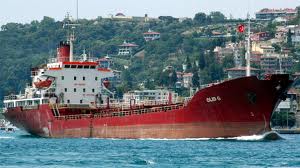
|
Malta-flagged, Greek-owned Olib G
(Source: convenientflags.blogspot.com)
|
“We are just waiting,” Aysel Aricioglu, the wife of kidnapped sailor Mustafa Aricioglu, told the Hürriyet Daily News this week.
The three Turkish sailors, along with 15 Georgian colleagues, were kidnapped on Sept. 8, 2010, when Somali pirates captured their ship [Olib G], which is Greek-owned but flies a Maltese flag, in the Straits of Aden.
The members of the ship were allowed to call their families immediately after their capture, but they have been unable to communicate with them since April 2011, according to relatives.
Family members say they have tried to contact the prime minister and government officials in Turkey and Greece on the issue, yet there has been no response.
Banu Özçelik Göçtü, the sister of Fuat Özçelik, told the Daily News that she hoped her brother was still alive.
“We learned that Turkish state has some diplomatic tension with Greece and therefore there has been no official attempt to save the sailors. But we are still hoping,” she said.
Officials from the Turkish Foreign Ministry told the Daily News on Wednesday that they were aware of the issues but added that since the ship was Greek-owned, a sea operation to rescue the hostages could only be conducted under Athens’ auspices. Read more OCEANUSLive.
Book Trail
The Chandlers: So how did you cope with being kidnapped by pirates? asks Colin Freeman.
Paul and Rachel Chandler, who were held by Somali pirates while sailing around the Seychelles in 2009, compare notes about their 13-month ordeal with The Sunday Telegraph's former captive, Colin Freeman.
So when I had the chance to meet yachters Paul and Rachel Chandler last week, it was a distinctly unusual feeling. First, because they’re among the very few other Britons who have languished at the hands of Somali pirates, and, second, because their marathon ordeal – to be frank – makes mine look a bit of a picnic. See video interview.
It shouldn't be newsworthy, but the Chandler's decision to continue their round the world voyage is worth noting, says Robert Young Pelton, publisher of Somalia Report.
The Chandlers were kidnapped by pirates in November of 2009 as they sailed from the Seychelles to Tanzania. It was a traumatic event for two people who only intended to enjoy their retirement. They are refitting their yacht and instead of putting the event behind them they have decided to share their ordeal and perhaps fund their voyage with some advance money from their publisher.
 To promote their upcoming book Hostage: A Year at Gunpoint with Somali Gangsters, The Guardian asked Colin Freeman do the interviewing [See above].
To promote their upcoming book Hostage: A Year at Gunpoint with Somali Gangsters, The Guardian asked Colin Freeman do the interviewing [See above].
Freeman was kidnapped in November of 2009 with Spanish photographer Jose Cendon when they ventured to Puntland to write a story about kidnapping. Although Freeman was only held for 40 days, he wrote a book about his experiences as a hostage. Jose Cendon also took a year off to write his version. There are more books on the way.
In August of 2008, Canadian freelance journalist Amanda Lindhout was returning from a refugee camp outside Mogadishu and found herself kidnapped along with Australian Nigel Brennan. Through the efforts of the Canadian government she was finally released on November 25, 2009 after 462 days in captivity. She and Brennan have written separate books with Nigel's book doing well after this summer's release down under. Lindhout's account is due next year. Lindhout has also turned her brutal experience in Somalia into a productive career as a humanitarian focusing on Somalia through Global Enrichment Foundation.
Captain Francis Roucou of the Indian Ocean Explorer, who was kidnapped by pirates in 2009 launches his book, ‘88 days’, the story of his ordeal in pirates’ hands Neptune Maritime Security.
Currently, pirates are holding two South African sailors, and hundreds of mariners inside Somalia. The plethora of books do not cover the beatings, murders, suicides and deep loss experienced by the thousands of people traumatized by pirates. Hopefully the existing and upcoming books will provide insight and spur direct action by the world's governments to do something meaningful about the ongoing threat of kidnapping, piracy and brutalizing of humans in the region.
Piracy events
1 Hijack:
-
Gulf of Aden– September 8 at 1317 UTC in position 15:27N – 052:14E approximately 142nm Southwest of Salalah, Oman and 10nm off the coast of Yemen, a French catamaran, SY Tribal Kat, was attacked by pirates. The vessel is reported to have been hijacked (via MSCHOA). UPDATE: EUNAVFOR warship, FGS Bayern, responded to a distress call and located a yacht off the coast of Yemen. An inspection of the yacht found no persons on board. The whereabouts of the crew is unknown at this time. For further information please contact the French Foreign Ministry at telephone number +33143175757.
6 Unsuccessful Attacks (All Regions, including late reports):
- Red Sea - August 23 (late report) at 1054 LT in position 14:58.40N - 042:00E, Marshall Island-flagged container ship, Manolis P, approached by pirates in 4 skiffs on two occasions. The Master raised the alarm and the crew locked themselves in the citadel. The pirates escaped when a warship arrived to assist the vessel.
-
South America (A) August 26 (late report) at 0600 UTC: in position 10:10.52N-064:46.05W, Jose Port Anchorage, Venezuela. Two skiffs with 11-12 robbers approached a Greece-flagged bulk carrier, Maria L, at anchor. Crew alerted armed security guards onboard who opened fire resulting in the robbers moving away.
-
Gulf of Oman - August 27 (late report) at 0350 LT in position 25:06.8N - 057:57.3E, Marshall Island-flagged LNG gas carrier, Maharshi Labhatreya, was chased by pirates in a skiff. The master raised the alarm and initiated evasive manoeuvres. The pirates aborted the attempted boarding.
- September 1, Liberia-flagged vessel, attacked 34nm Southwest of Salalah. Oman Navy, including aircraft, rescued ship. Additionally, a previously hijacked Indian dhow, Tiba-2 Halima, with 11 crew, freed by Oman Navy, and arrested 10 pirates (via Khaleej Times and Oman Tribune).
-
Arabian Sea – September 3 (via MSCHOA) at 0949 UTC, a merchant vessel in position 21:45N - 060:31E, approx 157nm SE of Muscat, Oman, came under attack by 2 skiffs with 5 POB. Weapons were fired at the MV. No further details available.
-
South China Sea - September 8 at 2343LT: in position 01:07.45N - 103:35.75E, Nipah Island, Indonesia. 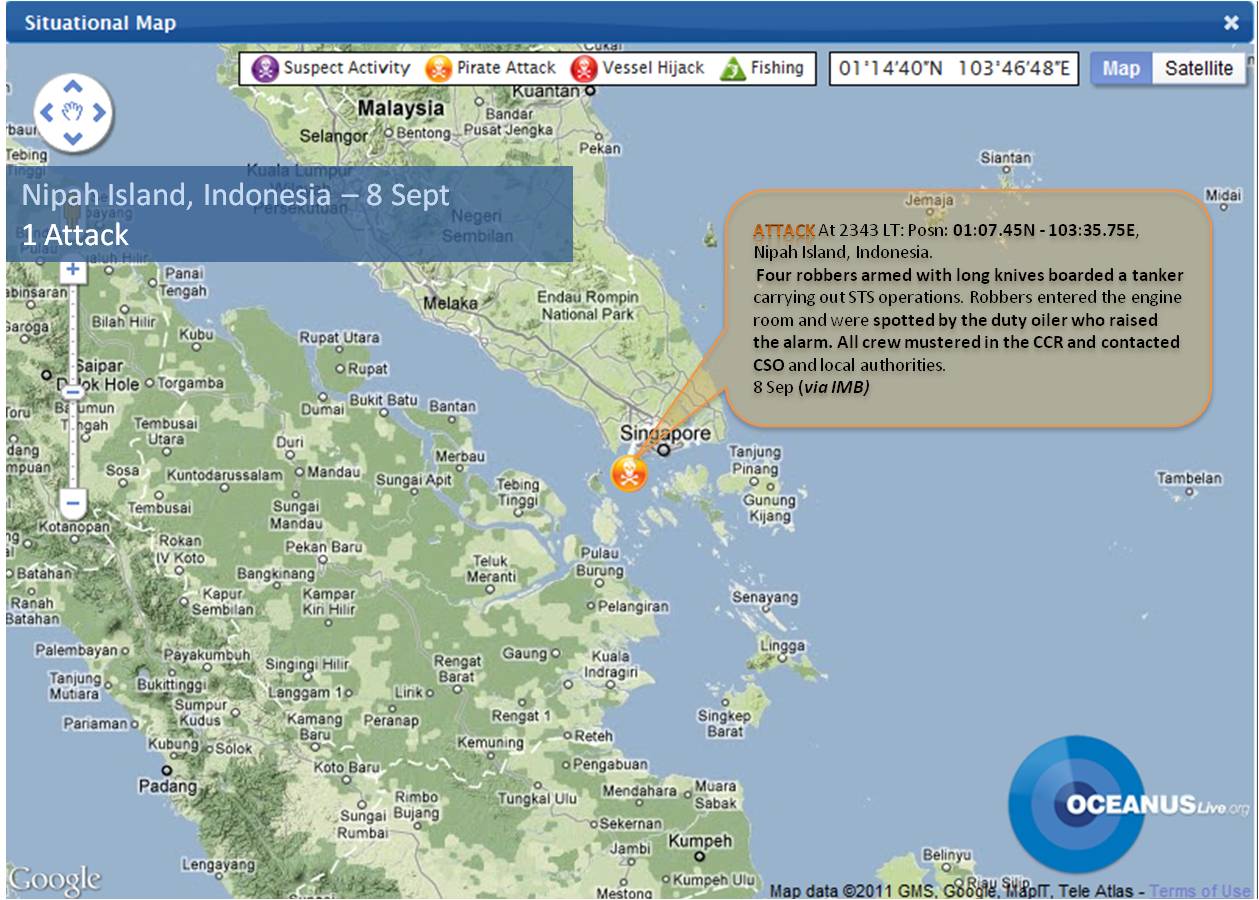 Four robbers armed with long knives boarded a tanker carrying out STS operations. Robbers entered the engine room and were spotted by the duty oiler who raised the alarm. All crew mustered in the CCR and contacted CSO and local authorities. Later naval personnel boarded the vessel to conduct a search.
Four robbers armed with long knives boarded a tanker carrying out STS operations. Robbers entered the engine room and were spotted by the duty oiler who raised the alarm. All crew mustered in the CCR and contacted CSO and local authorities. Later naval personnel boarded the vessel to conduct a search.
Suspect Activity:
-
NATO Shipping Centre, in its weekly assessment, states there have been no pirate attacks or significant activity throughout the entire region. Some suspicious activity was noted in the Southern Red Sea, however it was not deemed to be a piracy approach or an attack. This reduced level of pirate activity is expected to be temporary and due to several factors including recent ransom activity and poor weather. Reports of theft of local dhows appear to be on the increase and may be related to predictions of anticipated piracy activity in the next few weeks.
-
The recent attacks on shipping within territorial waters (Oman, for example) are a reminder of the need to be alert for pirate activity at all times. It is strongly recommended that all vessels continue to maintain a high state of readiness and vigilance, implementing BMP at all times within the High Risk Area.
At least 18 ships and an estimated 334 seafarers remain captives of the Somali pirates. Particular concern was highlighted for the South African couple, Bruno Pelizzari and Debroah Calitz (SY Choizil) who are being held in southern Somalia, an area severely affected by the humanitarian blight of famine.
Somalia Report's Weekly Piracy Report provides a roundup of vessel held and additional insight into pirate activity in the region.
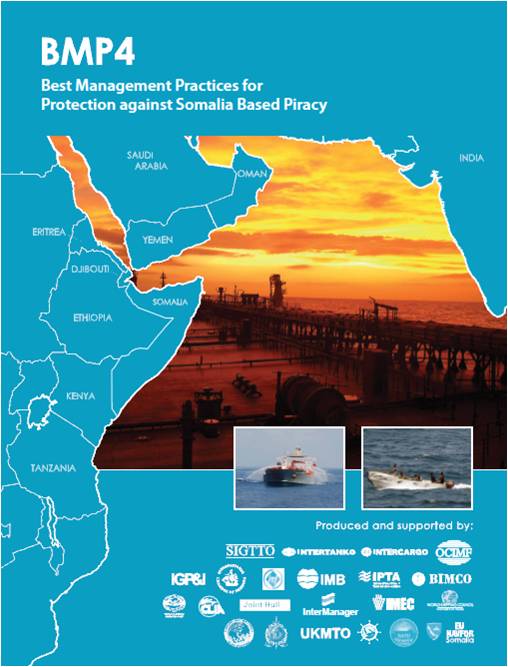
Vessels are reminded that the coalition forces' warships may not be in the vicinity of a pirate attack, subsequently, it is emphasised that seafarers can greatly reduce their chances of being pirated if they follow precautions as recommended in the Best Management Practices, increasing speed and carrying out evasive manoeuvres is a proven deterrent to piracy attacks. BMP version 4 is available at the link above; a high resolution version can be downloaded here. The DVD, Piracy: The Menace At Sea trailer can be downloaded at these links (via Steamship Mutual):
Vessels are advised to exercise extreme caution when navigating in the vicinity of any reported positions of attacks and maintain maximum CPA with any ship acting suspiciously. Additionally, registration of vessel movement with MSC(HOA) prior to transiting the region is recommended.
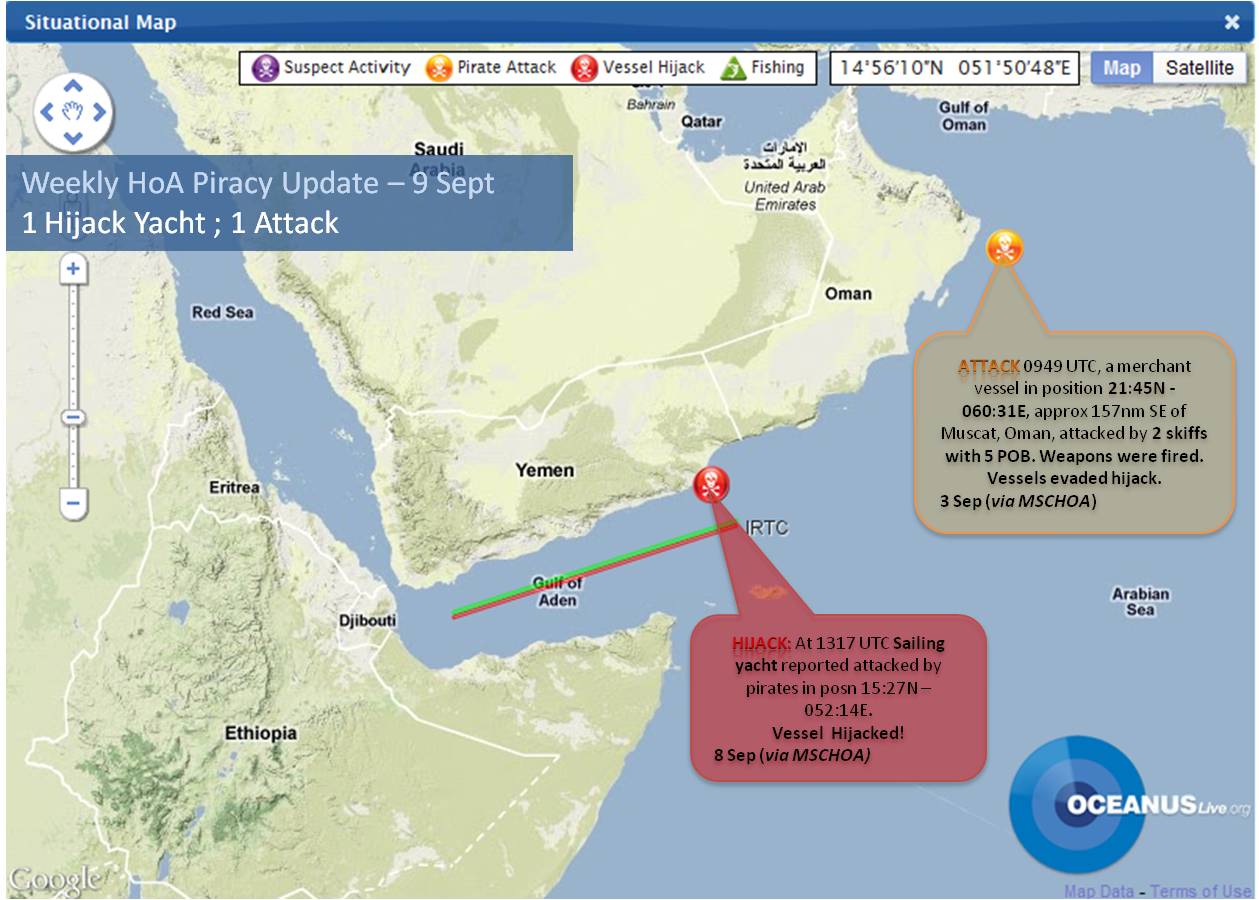
OCEANUSLive.org permits the reproduction of this image providing source and link are published (Map ToU)
Any suspicious activity should be reported to UKMTO in Dubai in the first instance (Email UKMTO or Telephone+971 50 552 3215) and on entering the UKMTO Voluntary Reporting Area (VRA) bound by Suez, 78E and 10S.
OCEANUSLive.org
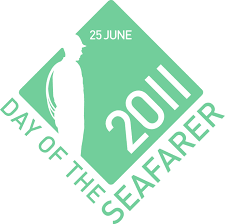

Information, Security, Safety; Shared
Submitted by Team@oceanuslive.org